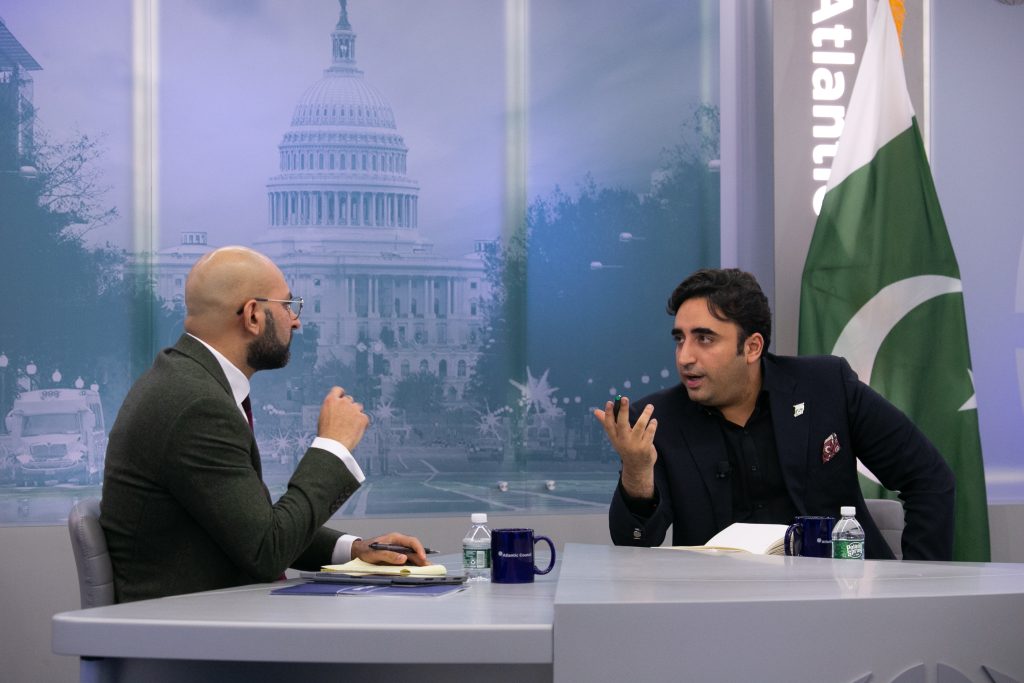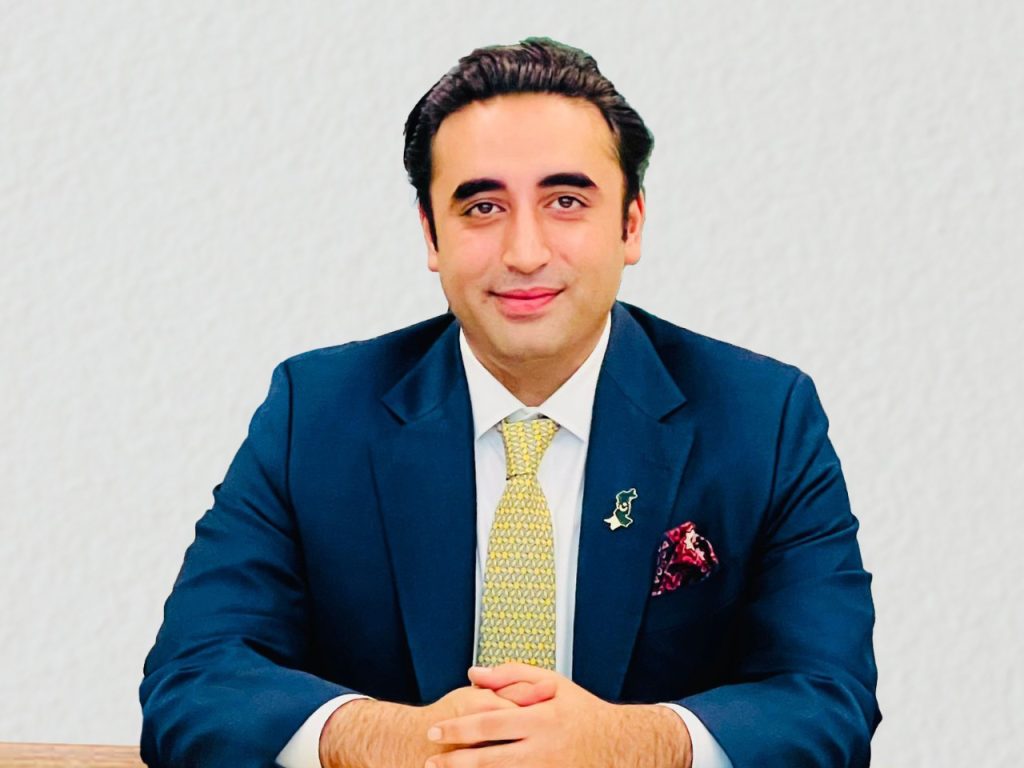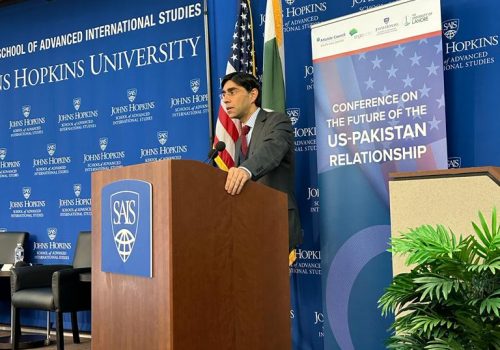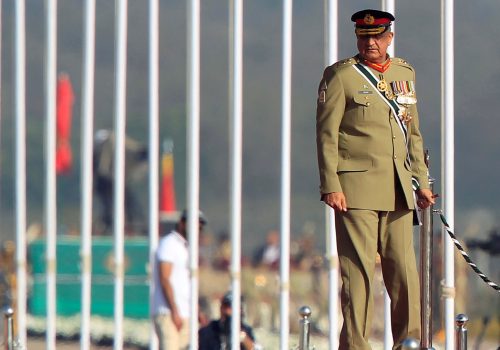Watch the full event
The role Pakistan plays in the international scene may depend on how the global community responds to its growing litany of challenges, as the South Asian nation grapples with heightened political and economic insecurity, as well as the aftermath of a historically devastating monsoon season.
“The way in which we engage with each of these issues, the solutions we find for them, and our ability to implement those solutions will decide the direction of Pakistan’s policy in the coming decade, two decades… and it will decide the direction of Pakistan’s foreign policy in the times to come,” said Foreign Minister Bilawal Bhutto Zardari on Tuesday at an Atlantic Council Front Page event in Washington.
Pakistan’s youngest ever foreign minister— the thirty-four-year-old whose mother was prime minister and father was president assumed the post in April under the new government of Prime Minister Shehbaz Sharif—spoke at length about the mounting challenges his nation is facing and his vision for rallying the international community to address them. Read on for more highlights from his remarks and conversation with Uzair Younus, director of the Pakistan Initiative at the Council’s South Asia Center.
Coping with climate disaster
- “We experienced this year what can only be described as a climate catastrophe of biblical proportions,” Bhutto Zardari said of the monsoons that raged over Pakistan from June until the end of September, affecting thirty-three million people, roughly one in seven Pakistanis. By the time the rains had stopped, one third of Pakistan’s land mass—an area roughly the size of Colorado—was underwater, with damages topping thirty billion dollars.
- Nations could see serious geopolitical consequences if Pakistan’s already teetering institutions worsen. “If we get this wrong, this is a crisis situation waiting to explode in our faces,” Bhutto Zardari said, even as he acknowledged that asking for humanitarian relief funds was a challenge given the fiscal constraints on economic powers because of COVID-19, inflation, and Russia’s war against Ukraine.
- However, Bhutto Zardari hoped nations would rally to help Pakistani citizens now and use it as a test case for building resilience against future climate disasters, wherever they should next arise. “Granted it will take time, but once we address their needs and we rebuild, we can do so in a manner that they are better off than they were before,” Bhutto Zardari said.
More than security
- In the past decade, Bhutto Zardari said that 90 percent of US-Pakistan conversations were focused around counterterrorism. Now the agenda has broadened to include everything from climate to agriculture to health care. “We have a far more comprehensive itinerary around which we are engaging,” he said.
- Still, particularly after the Taliban takeover of Afghanistan last year, security remains a critical discussion. Bhutto Zardari said he would try to work with the Taliban, particularly when it comes to striking back against the Tehreek-i-Taliban Pakistan terrorist organization. “We can’t change what happened in the past” in Afghanistan, Bhutto Zardari said. “What we can do is be serious about what we’re going to do going forward. Are we going to learn from our mistakes?” The answer, he added, will define “the safety and stability of our region.”
- Bhutto Zardari recently visited Singapore and Indonesia, the latter of which is the world’s largest Muslim nation yet doesn’t even have a direct flight to Pakistan. He imagines Pakistan could become a hub between Southeast Asian and Central Asian nations. “In order to get there, I need to get my house in order,” he said.
- “Of course, it’s far more appetizing, the less chaos we have,” Bhutto Zardari said, adding that there are “definitely” still questions about Pakistan’s political and economic stability. “But that doesn’t mean we’re not trying to address it. Questions? Yes. But does it mean shutting the door? No.”
His investment pitch
- Pakistan hopes to expand and deepen its financial arrangements with a broader group of partners, particularly after it was removed in October from the “gray list” for terrorism financing operated by the global watchdog Financial Action Task Force—although this week’s hostage crisis hasn’t helped assuage Pakistan’s reputation for insecurity. “The main selling point we have is that we can become a logistical and trade hub… it’s the geographical location,” Bhutto Zardari said.
- The challenges facing Pakistan represent a major risk for businesses, but that risk also is a key part of Bhutto Zardari’s message to investors as he believes the country will be a story of opportunity within a decade or two. “My pitch to everyone is get in now, while you can—when everyone doesn’t see that opportunity—so you can maximize your benefit later.”
- Google has opened an office in Pakistan, and Meta has invested in fiber optic cable infrastructure. Bhutto Zardari noted that Facebook accepts rupees and could pursue a monetization model that rewards content creators in Pakistan. However, existing “data protection” policies—including Pakistan’s Prevention of Electronic Crimes Act of 2016—have kept tech companies from fully investing in the country, with Bhutto Zardari revealing that Pakistan leads the world in requests to remove content on Facebook.
Nick Fouriezos is a writer with more than a decade of journalism experience around the globe.
Watch the full event
Further reading
Tue, Dec 6, 2022
Top ten takeaways from the 2022 Conference on the Future of the US-Pakistan Relationship
SouthAsiaSource By
The top ten takeaways from the 2022 Conference on the Future of the US-Pakistan Relationship, hosted in in partnership with the Engro Corporation, the University of Lahore, and the Johns Hopkins University School of Advanced International Studies.
Wed, Nov 16, 2022
Experts react: Appointment of a new army chief in Pakistan
SouthAsiaSource By
With Chief of Army Staff General Qamar Javed Bajwa set to retire on November 29, 2022, the appointment of a new army chief prompts a new set of challenges. South Asia Center experts provide their analyses of the situation.
Mon, Oct 3, 2022
Pakistan sees growing culture of innovation amid tech startup boom
Report By
A tightening global macro environment coupled with increasing domestic political instability is a cause of concern for the sector, especially the domestic startup economy.




